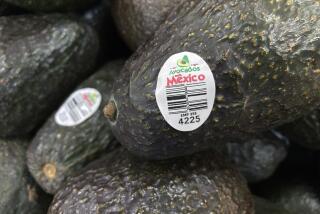Some Grapes Get to Market, but Tons Go to Seed
- Share via
Shoppers will find Chilean grapes back on the market this week as federal inspectors begin checking stored fruit today, releasing what is deemed safe for human consumption.
“They’re going to attempt to save what they can,” said a relieved Jeff Waite, manager of Pacific Cold Storage in City of Industry. “I’ve got 6 million pounds of fruit in here!”
More imported grapes are stored at the Christian Salvesen facility in La Habra.
An estimated $20 million worth of fruit, at retail prices, is being held at docks and airports around the United States. An additional $4 million worth is on the way, and $15 million more remains in Chile awaiting clearance for shipment, according to the federal Food and Drug Administration.
Initial reports late last week indicated that all Chilean fruit already unloaded and moved beyond docks and airports would be destroyed after the discovery by federal inspectors of two cyanide-tainted grapes in a cargo received at the Port of Philadelphia on March 8. Produce that grocers and wholesalers pulled off the market last week will have to be destroyed, said Gordon Scott, a spokesman for the Food and Drug Administration in Los Angeles.
Inspection was stepped up after the U.S. Embassy in Santiago received two anonymous telephone calls since March 3 warning, in Spanish, that Chile’s exported fruit was poisoned. No other poisoned samples have turned up, the FDA said, but a third warning call was received over the weekend.
The FDA and importers worked out inspection procedures acceptable to the government in weekend discussions, Scott said. The procedures cover grapes in storage as well as air-freighted berries at Los Angeles International Airport. Talks continue on how to clear other untainted fruit varieties, he said.
Meanwhile, 20 persons, newly hired by importers, underwent intensive training Monday at Pacific Cold Storage. Workers painstakingly scrutinized each grape on every bunch in a carton under the close supervision of FDA technicians teaching them the telltale signs of food tampering and cyanide poisoning.
Once formal inspections begin today, the new inspectors will check a 5% sample of all stored grapes and air-freighted strawberries, blackberries, raspberries and blueberries. FDA technicians will double-check 1% of that sample, Scott said.
Disposal Is Costly
Fruit passing these inspections will then be labeled “Safe for Human Consumption” and released for sale.
“There’s a strong possibility that we’ll have product (appearing in markets) Wednesday night or Thursday morning,” said Mark Berlinger, a salesman with David Oppenheimer-California, which imports about one-third of the Chilean fruit that moves through the adjacent ports of Los Angeles and Long Beach.
David Oppenheimer has about 1,200 unbroken pallets of grapes in storage, he estimated. Each pallet contains about a ton of fruit.
Waite said fruit that rots before inspection or for which no satisfactory procedure can be devised will have to be trucked to landfills. The nearest to Los Angeles is 200 miles away, at Kettleman Hills, just west of Interstate 5 in the San Joaquin Valley. Waite said dumping would cost about $20 a ton, roughly one pallet.
“I have 4,000 pallets on hand,” he said. Labor and hauling charges would be extra.
More to Read
Sign up for Essential California
The most important California stories and recommendations in your inbox every morning.
You may occasionally receive promotional content from the Los Angeles Times.













